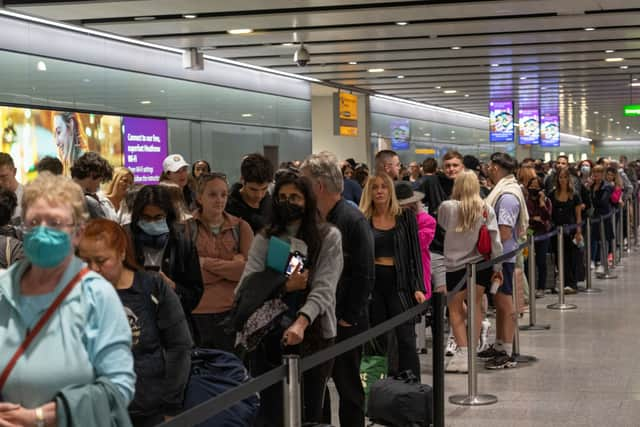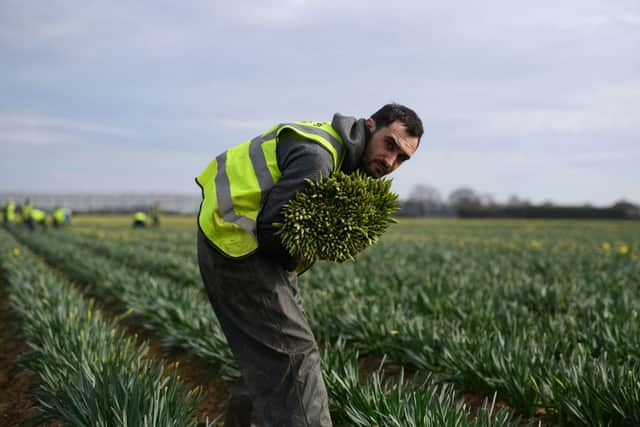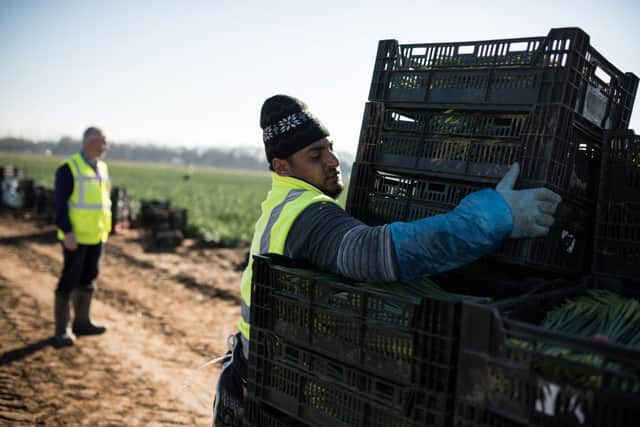Why is employment below pre-Covid levels? Reasons UK businesses are struggling to employ new staff explained
and live on Freeview channel 276
The UK is currently in the middle of the worst cost of living crisis for decades, with inflation sitting at a record 9.1%.
While workers are being hit as wages have been failing to keep up with the price hikes, UK businesses are also struggling to fill vacancies.
Advertisement
Hide AdAdvertisement
Hide AdIndeed, employment levels are still below pre-Covid pandemic levels, while unemployment rates are sitting at their lowest proportion of the workforce in almost 50 years.
So why, with people struggling to afford the cost of living, are firms struggling to recruit new staff?


What are UK rates of employment and unemployment?
Every month, the Office for National Statistics (ONS) publishes estimates of how much employment and unemployment there is in the UK.
Using the Labour Force Survey of 40,000 households, the ONS is able to glean in-depth insights on the world of work up and down the country.
Advertisement
Hide AdAdvertisement
Hide AdAccording to the most recent official data, the employment rate in the UK was 75.6% (over 32.7 million staff) in the period running from February to April 2022.
While this was 0.2% up on the previous quarter, it was still 0.9% (366,000 workers) below the levels recorded in the run up to the Covid pandemic.
According to the ONS, half a million people have “completely disengaged” with the UK labour market since Covid.


Overall, job vacancies hit a record high of 1.3 million in May 2022.
Advertisement
Hide AdAdvertisement
Hide AdMeanwhile, the unemployment rate for people over the age of 16 between February and April 2022 was just 3.8%.
This was the lowest rate since late 1974 - 48 years ago - and means there is a small pool of labour from which employers can secure new staff.
Which industries are struggling with recruitment?
Most industries are battling a recruitment crisis of one sort or another.
Hospitality and tourism
According to the ONS, the worst-affected industry is hospitality, which has around 174,000 unfilled jobs.
Advertisement
Hide AdAdvertisement
Hide AdA recent survey by trade bodies UKHospitality, the British Institute of Innkeeping, and the British Beer and Pub Association found 45% of operators had been forced to cut their trading hours or capacity in order to cope with the shortages.


The organisations estimated the situation had cost the industry £21 billion in lost revenue and saw £5 billion less paid to the Treasury in tax.
Both front-of-house staff and chefs were in the highest demand, the survey found.
NationalWorld spoke to Sarah Heward, who is the founder and director of Real Food Café in Tyndrum - a rural Scottish village that sits between Glasgow and Fort WIlliam - about how these unfillable vacancies have been affecting her business.
Advertisement
Hide AdAdvertisement
Hide AdShe told us that a lack of EU workers coming over as a result of Brexit, plus “significant” furlough costs have created a “damaging recruitment situation”, and accused the government of “looking in the other direction”.


“Whilst we are managing to maintain our opening hours and full menu, we have closed our bakery and are using ready-made cakes instead, and we have been unable to open our coffee kiosk this year, despite there being demand,” Ms Heward said.
“The other unseen consequence of staff shortages is that wages have jumped up exponentially. Ours have increased 22% in the last year, in addition to food and energy inflation, which obviously had to be passed onto the customers.
“Another damaging factor is the considerable amount of management time being taken up in the recruitment process. This alone is strangling our ability to work on developing and growing the business.”


Advertisement
Hide AdAdvertisement
Hide AdTourism is another sector that is struggling - the evidence of which has been seen and felt at airports across the UK since Easter.
Flights have been cancelled and massive queues have snaked through terminals as airports and airlines struggle to fill vacancies for everyone from baggage handlers to security staff.
NHS and social care
The NHS and social care are also being hit, with industry body the NHS Confederation reporting there are currently more than 100,000 unfilled jobs across the health service.
Meanwhile, NHS Digital figures showed a vacancy rate of 10% for nursing staff, which equated to 38,972 roles, as of 31 March 2022 (the latest data available) - an increase of 0.8 percentage points (more than 5,00 jobs) compared to the previous year.
Advertisement
Hide AdAdvertisement
Hide AdA survey of more than 20,000 nurses by the Royal College of Nursing suggested that only a quarter of shifts had the planned number of registered nurses on duty - down from 42% in 2020.
Some 25,000 nurses left the profession in 2021 as a result of becoming demoralised, according to the RCN.


“Staff shortages and workforce capacity present one of greatest challenges to NHS recovery and the return of safe, high-quality health services for all,” explains Danny Mortimer, chief executive of NHS Employers and deputy chief executive of NHS Confederation.
“We urgently need the government to commit to producing a long overdue and desperately needed workforce plan for the NHS to help close the gap on the 105,000 vacancies the health service is carrying, and to plan to respond to the growing demand across healthcare.
Advertisement
Hide AdAdvertisement
Hide Ad“This needs to be allied to a comprehensive plan for the social care workforce where the challenges are profound.
“Hard pressed teams across social care and health need to be given hope by the government that there is a transparent plan to fill the gaps in their teams and rotas, especially in services and professions where there is the greatest risk to service delivery and quality.”
The Department for Health and Social Care told NationalWorld that its policies have led to “record numbers of doctors, nurses and healthcare staff” in the NHS.
“We are well over halfway towards meeting the government’s commitment to recruiting 50,000 extra nurses by 2024, and have commissioned NHS England to develop a long-term workforce strategy to provide certainty for the future,” a spokesperson said.
Advertisement
Hide AdAdvertisement
Hide Ad"The GP workforce is growing – there were over 1,400 more full time equivalent doctors working in general practice in March 2022 compared to March 2019 and a record-breaking number started training as GPs last year.”


Other industries which are currently struggling include construction, food, and freight.
Staff shortages in the latter industry led to a fuel supply crisis and empty shelves in autumn 2021.
Why are vacancy rates so high?
There are several reasons for why there are so many vacancies.
Advertisement
Hide AdAdvertisement
Hide AdMost industry bodies put the situation down to two major factors: the Covid pandemic and Brexit.
The war in Ukraine is also proving to be a factor for some UK businesses.
Here’s why:
Covid
When the UK went into its various national lockdowns, several industries were essentially forced to close down.
These included the hospitality and airline businesses.
It meant they had to either place their staff on furlough or make them redundant.
Advertisement
Hide AdAdvertisement
Hide AdRedundancies hit a record high of 14.4 per 1,000 workers in 2020, according to the ONS, with the current rate sitting at under two people per thousand.
Some of the people who lost their jobs moved across to other industries - like digital retail, which boomed during the pandemic - some left the country (see more below), while others opted to retire.
Qualifications and exams for skilled roles, for example lorry driver tests, also ground to a halt, meaning fewer people were entering the jobs market for these positions.
The situation meant that when Covid restrictions eased and economic activity picked up again, businesses struggled to recruit new staff.
Advertisement
Hide AdAdvertisement
Hide AdAccording to KPMG and the Recruitment and Employment Confederation (REC), it has led to a labour market where there is “intense” competition for workers which has led to a “steep” rise in pay rates on offer.
A report by the two firms that was based on a survey of 400 recruitment agencies found salaries for new permanent staff rose at the second-fastest rate in more than 24 years in February 2022, while temp pay also increased sharply.


This effect could be seen in the freight industry last autumn, when a national shortage of lorry drivers led firms to offer five-figure signing on bonuses to attract workers across from other jobs, like bus driving.
Another knock on from the pandemic has been a dramatic change to how we work.
For example, many of us switched to home or hybrid working.
Advertisement
Hide AdAdvertisement
Hide AdIt is believed that this is one of the reasons why hospitality firms are struggling to compete with other industries for workers.
Brexit
According to figures from the The Migration Observatory at the University of Oxford, between 2007 and 2019 EU workers accounted for the majority of people travelling to the UK to work.
However, from a high point in 2015, when 177,000 EU people migrated to the UK for work (71% of all migrant workers), numbers declined to 76,000 workers (45% of all migrant workers) in 2019 - the last year of the analysis.
The report put forward several explanations for why this may have happened, including a fall in the value of the pound (which reduced the value of wages in the UK), the political climate; and the fact that EU migration had been unusually high before the referendum.


Advertisement
Hide AdAdvertisement
Hide AdCovid appears to have dented the number of non-UK workers living in the UK yet further, with the Economic Statistics Centre of Excellence estimating a drop in population of 1.3 million people in 2020.
What this all suggests is that there are fewer migrant workers in the UK.
Recruiters have struggled to replenish this pool of workers as a result of post-Brexit immigration rules.
The points-based immigration system introduced when the UK formally left the EU in January 2021 has been designed to let in people with certain qualifications and skills - but makes it hard for workers deemed to be ‘unskilled’ to enter the country.
Advertisement
Hide AdAdvertisement
Hide AdThe government has repeatedly pushed back against calls to relax this policy, but businesses have warned staff shortages are holding back economic growth.


For example, when airport and airline bosses called for a temporary relaxation of visa requirements to solve their staffing crisis in June, Transport Secretary Grant Shapps insisted the Brexit vote had been about moving on from hiring “cheap labour from somewhere else”.
There have been limited instances where the government has been forced to relax its immigration policy.
For example, it granted 800 temporary visas to allow foreign butchers into the UK to clear a backlog of pigs in slaughterhouses.
Advertisement
Hide AdAdvertisement
Hide AdBut it appears no major changes are on the horizon under the current government.
The war in Ukraine
The Russia-Ukraine has had an impact on the number of workers available to some industries.
For example, in 2021 between 60% to 70% of the workers who came to the UK to do temporary farm roles - the only sector to have its own special immigration route - came from Ukraine, with Russians forming the next largest group of workers.
The war has meant fewer of these workers have been able to make it to the UK, and has led to labour shortages.
These shortfalls have forced some fruit and vegetable growers to not pick some of their crops.
Comment Guidelines
National World encourages reader discussion on our stories. User feedback, insights and back-and-forth exchanges add a rich layer of context to reporting. Please review our Community Guidelines before commenting.
